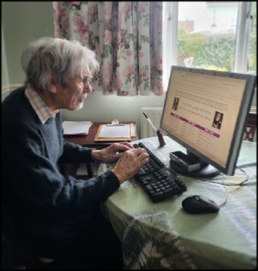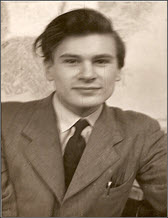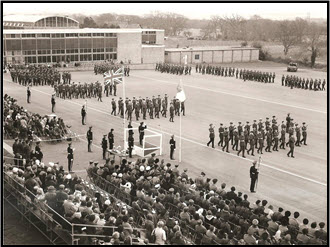


 I was born in the city of London, so I’m a true cockney and proud of it! The family then lived in Essex, but in 1936 we moved to Greenford, then an area of open countryside some ten miles west of London. I struggled with my school work, and in 1941 I failed my eleven- plus exam. Fortunately, I was selected to go to a new type of school – a Secondary Modern School – and from there I gained a place in a commercial polytechnic school (learning typewriting and shorthand), and then a place at Acton College, taking and passing the Matriculation examination – a basic qualification for a possible place at a university (there were only seven at that time!) In 1948 I was called up for National Service and served over two years in the Royal Air Force as a clerk special duties. This entailed a study of radar, and the plotting and directing of aircraft during the Berlin Blockade o
I was born in the city of London, so I’m a true cockney and proud of it! The family then lived in Essex, but in 1936 we moved to Greenford, then an area of open countryside some ten miles west of London. I struggled with my school work, and in 1941 I failed my eleven- plus exam. Fortunately, I was selected to go to a new type of school – a Secondary Modern School – and from there I gained a place in a commercial polytechnic school (learning typewriting and shorthand), and then a place at Acton College, taking and passing the Matriculation examination – a basic qualification for a possible place at a university (there were only seven at that time!) In 1948 I was called up for National Service and served over two years in the Royal Air Force as a clerk special duties. This entailed a study of radar, and the plotting and directing of aircraft during the Berlin Blockade o f 1948-1950. I was given a little time off to study via a correspondence course and, on, leaving the air force, gained a place at the University College of the South West (at Exeter), an outpost of London University. There, I not only gained a BA degree in History and French, but also the hand of my dear Peggy, my life-long companion! Based on my knowledge of typing and shorthand, I then joined the staff of the Hornsey Journal (a local newspaper in North London). I served as the chief reporter for three years and was then earmarked to become editor of one of the many newspapers serving London at that time. In 1957, however, we decided to seek adventure while we could, and went off to teach in a small missionary school in the depth of the Nigerian jungle, a day’s dr
f 1948-1950. I was given a little time off to study via a correspondence course and, on, leaving the air force, gained a place at the University College of the South West (at Exeter), an outpost of London University. There, I not only gained a BA degree in History and French, but also the hand of my dear Peggy, my life-long companion! Based on my knowledge of typing and shorthand, I then joined the staff of the Hornsey Journal (a local newspaper in North London). I served as the chief reporter for three years and was then earmarked to become editor of one of the many newspapers serving London at that time. In 1957, however, we decided to seek adventure while we could, and went off to teach in a small missionary school in the depth of the Nigerian jungle, a day’s dr ive east of Ibadan. It was a tough and demanding job over three years, but we were pleased to make a contribution to a country-in-the-making. We returned to the UK in 1960, and it was then that I gained a place as a civilian lecturer, teaching young entrants to become “Junior Leaders” at the Royal Amoured Corps, based at Bovington in Dorset. I served there until my retirement thirty years later! It was at Bovington that I wrote and illustrated The World at Large, and was given time to take an MA in War Studies at Kings College London. I then spent five years of my own time producing a thesis on the Relations between the Army and the Royal Air Force 1918-1939, and was awarded a London PhD in War Studies in 1980.
ive east of Ibadan. It was a tough and demanding job over three years, but we were pleased to make a contribution to a country-in-the-making. We returned to the UK in 1960, and it was then that I gained a place as a civilian lecturer, teaching young entrants to become “Junior Leaders” at the Royal Amoured Corps, based at Bovington in Dorset. I served there until my retirement thirty years later! It was at Bovington that I wrote and illustrated The World at Large, and was given time to take an MA in War Studies at Kings College London. I then spent five years of my own time producing a thesis on the Relations between the Army and the Royal Air Force 1918-1939, and was awarded a London PhD in War Studies in 1980.
Come retirement, I became a “Timewise Traveller”, spending the next ten years compiling a meaningful history of the British monarchy (35 monarchs in total) from 1066 to the death of Queen Victoria in 1901. This sought to give an all-round appreciation of each reign, dealing with the political aspect of course, but also including the development of all the major disciplines, such as literature, art, music, science, medicine, architecture and philosophy. It is a broad “sweep” of each period, but it does provide a meaningful appreciation of history in the round. It went on the Net in 2019, and I then produced a comprehensive study of the First World War (not just the Western Front!) six years later. I am now compiling a history of the Second World War – a struggle that I lived through – and ... hopefully! ... I plan to complete this work in 2027. Also available, as noted above, are The World At Large, an appreciation of the Cold War from 1945-1972, and a copy of my a doctoral thesis.
Incidentally, I have a copy of my junior school report for 1940. It places me 44th out of a class of 45, and the teacher writes: “But he tries his best”. Fair comment!
DEREK “DJ” WALDIE 1930 -
(Ph.D, MA, BA, Bsc(Econ), PGCE)




DJ - The Timewise Traveller



Author Note: I started writing poems in my spare time in 1944 – my first effort being about the destruction of my school by a doodlebug in May of that year. Over the years I have produced quite a few. They have mostly be written to amuse, but some are serious works.. As the title implies, they have no intrinsic merit, but if they raise a smile, then they will have been worthwhile!
To Read ‘An Apology for an Anthology’ Click Here



 I was born in the city of London, so I’m a true cockney and proud of it! The family then lived in Essex, but in 1936 we moved to Greenford, then an area of open countryside some ten miles west of London. I struggled with my school work, and in 1941 I failed my eleven-
I was born in the city of London, so I’m a true cockney and proud of it! The family then lived in Essex, but in 1936 we moved to Greenford, then an area of open countryside some ten miles west of London. I struggled with my school work, and in 1941 I failed my eleven- f 1948-
f 1948- ive east of Ibadan. It was a tough and demanding job over three years, but we were pleased to make a contribution to a country-
ive east of Ibadan. It was a tough and demanding job over three years, but we were pleased to make a contribution to a country-





